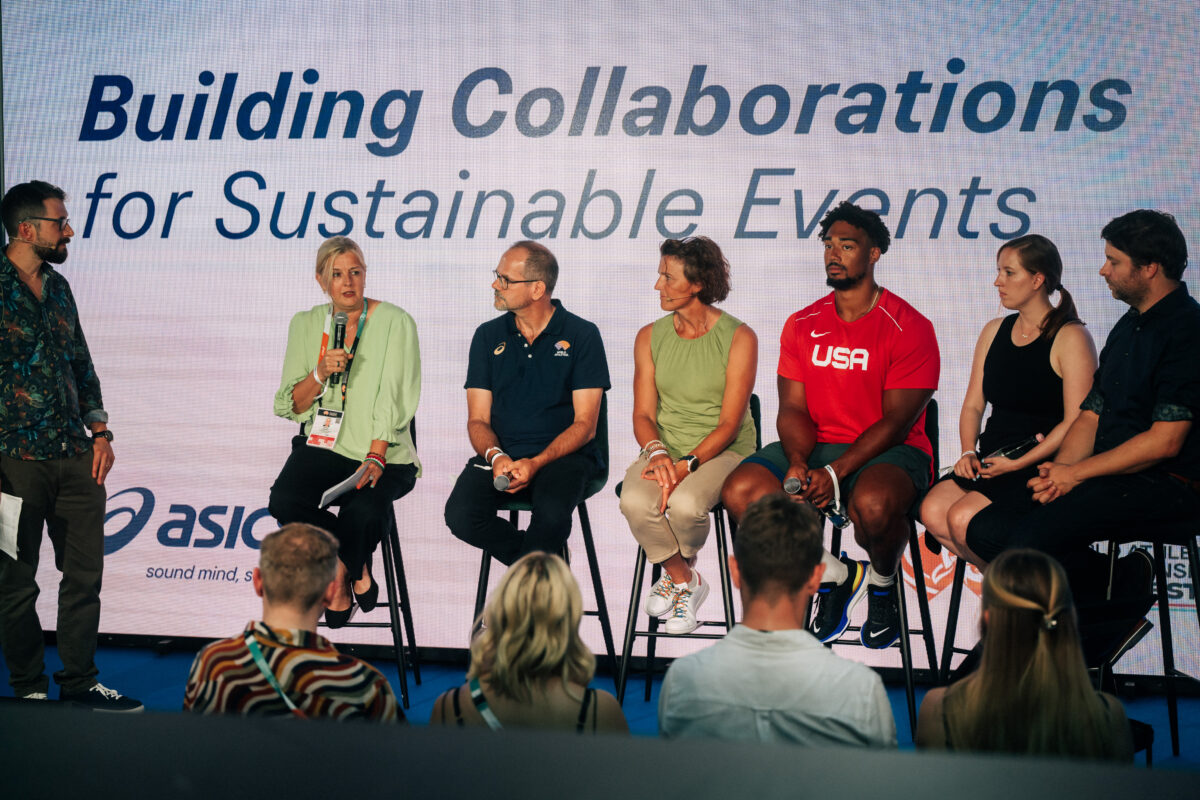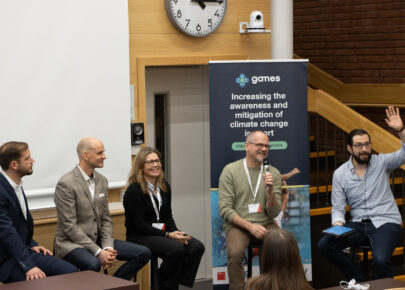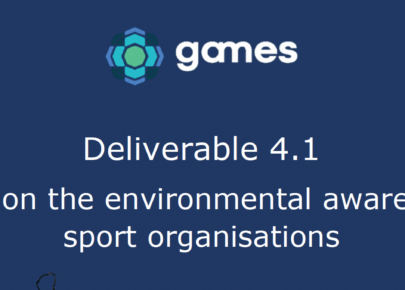Building Collaborations for Sustainable Events at Budapest 2023
During the 2023 World Athletics Championships, World Athletics hosted the ‘Building Collaborations for Sustainable Events’ panel discussion at the ASICS house in Budapest on Friday 25 August.
The session focused on three areas:
- Reviewing and examining the ambitions of World Athletics and the Budapest LOC around delivering an event in alignment with the World Athletics sustainability strategy
- Discussing the role of major events in setting strong examples around sustainable delivery
- Examining collaborations and partnerships and the expectations of partners and sponsors around sustainability at major events.
Matthew Campelli, sustainability partner of Touchline, the communication and dissemination partner of the GAMES project, moderated the session.
Participants on the panel were comprised of leading practitioners, researchers and scholars working at the intersection of sport and sustainability, including:
- Dr Susie Tomson – director of sustainability at ThinkBeyond
- Dr Madeleine Orr – sport ecologist, lecturer at Loughborough University London
- Sam Mattis – US discus athlete, World Athletics Champion for a Better World
- Petra Schmitt – sustainability manager, WCH Budapest 2023
- Marc-Ivar Magnus – vice president Trade, Corporate Responsibility and Legal, World Federation of the Sporting Goods Industry (WFSGI)
- Bob Ramsak – World Athletics head of sustainability
Schmitt began the session by expressing how “proud” she was that Budapest 2023 was the first World Championships event to embrace the ‘Athletics for a Better World’ standard. This is World Athletics’ Sustainable Event Management System (SEMS) used in this instance to advise and evaluate the Budapest LOC’s sustainable event delivery. The system was recently awarded the ISO 20121 standard.
You can read a previous article on the GAMES website to learn in detail about the sustainability measures at Budapest 2023 here.
Cities bidding to host World Athletics events from 2024 onwards – for which bids launched in the second half of 2022 – will require sustainability to be at the core of their events.
Ramsak explained that World Athletics only started working with Schmitt and the Budapest LOC eight months before the event, so described what they’ve been able to achieve together as “wonderful”. Expressing his anticipation to learn over the Championships’ two weeks and refine the Athletics for a Better World standard, he expressed that “to have an LOC excited about this was icing on the proverbial cake.”
Ramsak also mentioned his eagerness to share learnings with other stakeholders of the GAMES project, and that he wants to create a “circuit of auditors to continue collaboration” and ensure sports events are sustainable across the industry.
World Athletics and Ramsak have a longer relationship with Tomson and ThinkBeyond, beginning their work together five years ago. “This is a great step forward,” Tomson said of Budapest 2023, expressing that the authenticity of the event’s ambitious targets can shift the event’s impact towards transformational change.
Partnerships can enable transformational change at sporting events. Magnus explained that events like Budapest 2023 provide a platform to collaborate. “If you share suppliers, there’s a need for collaboration and it’s often necessary to do so,” he said. “If you really want to make a change on Scope 3, it requires collaboration.”
Orr explained the ‘demonstration effect’ of sports events to showcase these partnerships and sustainable initiatives, before moving on to the role of athletes in climate communications. Her research has shown that athletes are often hesitant to speak out about sustainability because they:
- Don’t feel like they know enough
- Think too much science is involved
- Feel like a hypocrite
But Orr explained that all three of these points are surmountable and that “everyone is a hypocrite when it comes to climate change”, so it’s better to be a hypocrite and do something about it by starting with “where you are and what you care about.”
Mattis’ training in Pennsylvania this summer has been affected by extreme heat and wildfires. After initially being hesitant to act on his passion for the environment, his “perception changed” after realising he didn’t need all the knowledge about it to do so.
Realising the growing sense in the athlete community that they could be losing a healthy environment to compete in, Mattis has encouraged athletes to get involved with sustainability via their national federation or using their media presence to show that sport can be part of the solution towards addressing climate change and not a problem. Mattis is now part of a World Athletics steering group to provide input on sustainability strategy from an athlete perspective, which he described as “a great experience.”
The panel concluded with Campelli asking the panellists what they think is required for transformational change in sport. Ramsak said that World Athletics are commonly asked where to start in sustainability, with challenges around resources and time rather than ambition. Transformational change, therefore, must revolve around urgency. “We need to figure out a way to use the influence we have to move towards decarbonisation, which ultimately has to be everyone’s goal.” Orr noted that this requires shared values, while Mattis added it needs “buy-in from all stakeholders.”
Listen to the full panel discussion on the World Athletics website here.






